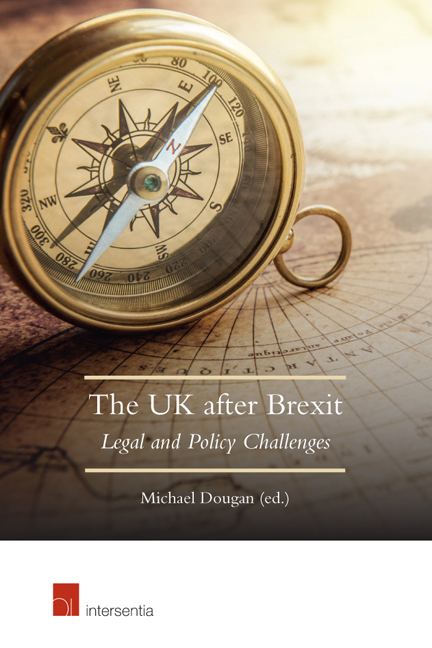Book contents
- Frontmatter
- Contents
- List of Authors
- Editor's Introduction
- Part I Constitutional Issues
- Part II Substantive Policies
- Chapter 5 Brexit and Employment Law
- Chapter 6 UK Environmental Law Post-Brexit
- Chapter 7 Extracting the UK from EU Financial Services Governance: Regulatory Recasting or Shadowing from a Distance?
- Chapter 8 Intellectual Property Law and Brexit: A Retreat or a Reaffirmation of Jurisdiction?
- Chapter 9 May We Stay? Assessing the Security of Residence for EU Citizens Living in the UK
- Chapter 10 Cross-Border Criminal Cooperation aft er Brexit
- Part III External Relations
- About the Editor
Chapter 6 - UK Environmental Law Post-Brexit
from Part II - Substantive Policies
Published online by Cambridge University Press: 13 October 2018
- Frontmatter
- Contents
- List of Authors
- Editor's Introduction
- Part I Constitutional Issues
- Part II Substantive Policies
- Chapter 5 Brexit and Employment Law
- Chapter 6 UK Environmental Law Post-Brexit
- Chapter 7 Extracting the UK from EU Financial Services Governance: Regulatory Recasting or Shadowing from a Distance?
- Chapter 8 Intellectual Property Law and Brexit: A Retreat or a Reaffirmation of Jurisdiction?
- Chapter 9 May We Stay? Assessing the Security of Residence for EU Citizens Living in the UK
- Chapter 10 Cross-Border Criminal Cooperation aft er Brexit
- Part III External Relations
- About the Editor
Summary
INTRODUCTION
While much of the post referendum Brexit discussion focused on economic and constitutional issues, the future of environmental law and policies received much less attention. Environmental protection barely featured as a campaign issue on either side of the referendum debate, and it is notably overlooked in the Brexit White Paper. Yet UK environmental law is deeply rooted in EU law and policies, and departure from the EU may herald significant changes within national law. Environmental law covers a broad range of public policies including biodiversity protection, air and water quality control, climate change and waste management, and deeply impacts on other key domestic policies such as agriculture, transport, industrial and energy policy. Moreover, uncertainty in environmental regulation significantly jeopardises its chance of effectiveness. Therefore, careful reflection on the impact of Brexit on environmental law is essential.
AREAS OF UK ENVIRONMENTAL LAW THAT WILL BE IMPACTED BY BREXIT
Environmental protection was not among the original European Economic Community policies. The first environmental measures were adopted in the early 1970s, initially to address the disruptive impact of different levels of national environmental protection on intra-EU competition. It formally became an area of competence shared between the EU and Member States in 1987. Despite its late start, EU environmental policy has undergone a major expansion: beyond traditional areas such as air, water, and nature protection, the EU environmental agenda covers waste, chemicals, climate change, marine protection, biodiversity and the urban environment. Moreover, EU law requires that environmental objectives and protection standards be integrated into other policy areas, notably agriculture, energy, industry and transport.
Much of the corpus of contemporary UK environmental law was either developed under the guidance of EU environmental law or is a direct application of EU law. Environmental law is an area densely populated with Directives, which for the most part have been transposed into national law and implemented domestically. For example, the bathing water standards, which the UK famously struggled to implement in the 1980s, and the EU air quality provisions which more recently have proved to be a bone of contention between the UK Government and the European Court of Justice (CJEU), are contained in Directives.
- Type
- Chapter
- Information
- The UK after BrexitLegal and Policy Challenges, pp. 115 - 134Publisher: IntersentiaPrint publication year: 2017



